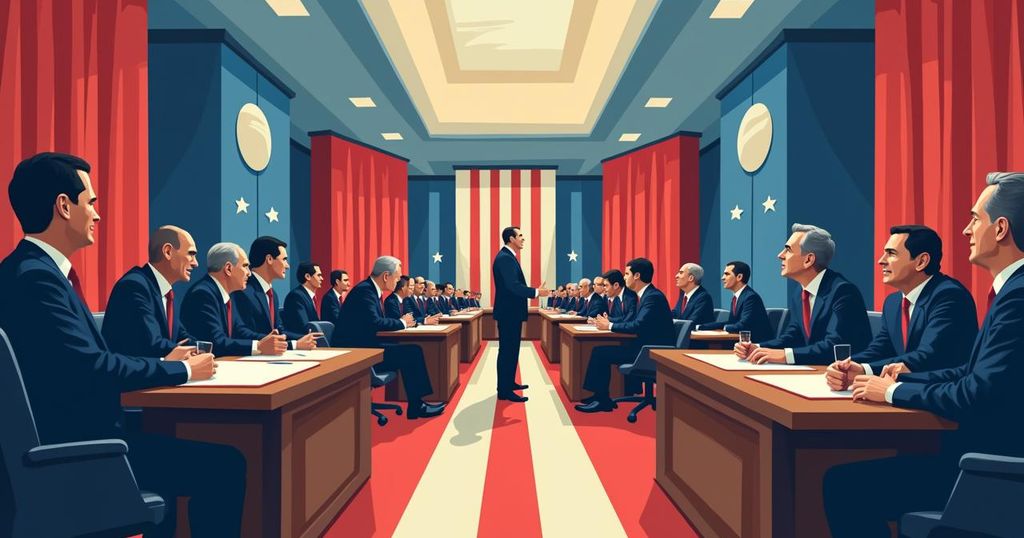Has the Presidential Election Become a Game of Random Chance?
The 2024 Presidential Election is navigating a landscape marked by unpredictability, mirroring the strategic adjustments seen in poker. Vice President Kamala Harris’s inconsistent public messaging raises questions about her campaign strategy’s effectiveness. The current electoral climate reflects a stagnation in voter engagement as both candidates—Harris and Trump—struggle to mobilize support amidst external crises. Ultimately, the unpredictable nature of voter behavior leaves candidates and commentators alike grappling with the chaos inherent in determining electoral outcomes, emphasizing a sense of uncertainty in the political sphere.
The discussion surrounding the 2024 Presidential Election has become a reflection of the unpredictable nature of chance rather than a systematic approach grounded in strategy. Much like the evolving strategies in poker, where players adapt their methods in response to game theory principles, political candidates are navigating an unpredictable landscape where their tactical choices may yield uncertain results. Vice President Kamala Harris’s recent public engagements exemplify this dilemma, as every statement appears to carry potential risks or benefits depending on the electorate’s diverse viewpoints. In the wake of escalating international conflicts, her approach ranges from demonstrating leadership to deferring responses, reflecting a broader struggle to find a consistent political strategy that resonates with voters. For instance, her evasive answers during interviews reveal a tension between articulating progressive views on contentious issues and maintaining broad electoral appeal. The unsettling reality of this election is that no definitive strategy guarantees success, leaving candidates to react reflexively to an ever-shifting political atmosphere. As both candidates—Harris and former President Trump—prepare for the final weeks of campaigning, the paradox persists: the stakes are high, yet the path to victory remains shrouded in uncertainty, complicating the tasks of political commentators attempting to analyze the implications of each move. Contrary to past elections characterized by fervent campaigning and high voter engagement, the current electoral climate appears stagnant, with both candidates struggling to inspire robust mobilization among their bases. Harris’s campaign approach lacks definitiveness, primarily positioning her as not Trump while neglecting to thoroughly convey how her policies differ from those of President Biden, creating an atmosphere of ambiguity in voter motivation and candidate effectiveness. Despite Harris’s intentions to engage undecided and moderate Republicans, the electorate seems to react apathetically, exhibiting a disconnection from typical campaign fervor. Ultimately, as the election date approaches, the uncertain nature of voter behavior underscores a profound challenge for both candidates. The intertwining of external crises and internal political dynamics complicates public perception and engagement—leading many Americans to feel as if they are merely spectators in a game of chance, rather than active participants in shaping their political future.
The 2024 Presidential Election presents a complex political landscape characterized by heightened polarization and unpredictable voter behavior. In an era where electoral strategies must adapt to rapidly changing circumstances, both major party candidates find themselves grappling with the challenges of appealing to a divided electorate. Notably, Vice President Kamala Harris’s positioning in the campaign raises questions about the effectiveness of her candidacy amid fluctuating public sentiment influenced by international crises and domestic issues. The backdrop of significant political events, including Trump’s controversial presidency and Harris’s undercurrents of strategy, plays a crucial role in shaping the current narrative surrounding electoral efficacy and voter engagement.
In conclusion, as the 2024 Presidential Election draws near, it becomes increasingly evident that both candidates are entangled in a web of unpredictability and chance. The lack of clear campaign strategies and the failure to mobilize voters underscores a critical moment in American politics where understanding voter sentiment has become an elusive objective. Consequently, individuals observing the electoral process may feel a sense of helplessness, unsure of how the outcomes may be dictated by circumstances beyond their control. This highlights the need for a reevaluation of political engagement methods in an era dominated by uncertainty, where each choice made by candidates can significantly sway the electoral outcome, yet remains inherently at the mercy of the electorate’s fickle preferences.
Original Source: www.newyorker.com




Post Comment